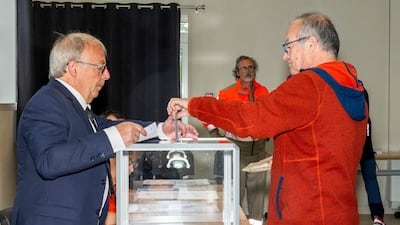France's far right is hoping for a historic success in the parliamentary election as voting began on Saturday in the country's overseas territories.
Marine Le Pen's anti-immigrant and eurosceptic party National Rally (RN) is leading, according to recent opinion polls.
French President Emmanuel Macron called the snap election earlier this month after his party suffered defeat in the European Parliament elections.
The move could see his presidency cut short three years before it was due to end if he loses.
Voting for the new National Assembly began in France's overseas territories that span the globe, with residents of the tiny archipelago of Saint Pierre and Miquelon, off the coast of Canada, casting their ballots on Saturday.
They were being followed by voters in France's islands in the Caribbean and the South American territory of French Guiana. Voting in territories in the Pacific will be followed by those in the Indian Ocean before it gets under way on the mainland on Sunday.
The candidates ended their frantic three-week campaigns at midnight on Friday, with political activity banned until the first round of voting in France on Sunday.
Most polls show that Ms Le Pen's RN party is on course to win the most seats in the 577-member National Assembly, parliament's lower house, although it remains unclear if the party will secure an outright majority.
“Victory is within our grasp, so let's seize this historic opportunity and get out and vote!” Ms Le Pen wrote on X on Friday, vowing to bolster purchasing power and “curb insecurity and immigration”.

A high turnout is predicted and final opinion polls have given the RN between 35 per cent and 37 per cent of the vote, against 27.5 per cent to 29 per cent for the left-wing New Popular Front alliance, and 20 per cent to 21 per cent for Mr Macron's centrist camp.
On Monday, Mr Macron plans to convene a government meeting to decide the course of action ahead of the second round of voting on July 7.
France is heading for a year of political chaos and confusion with a hung assembly, said Mujtaba Rahman, Europe head at Eurasia Group, a risk consultancy.
“There is no precedent in recent French politics for such an impasse,” Mr Rahman said.
Some 49 million French are eligible to vote.
Brice Teinturier, head of the Ipsos polling firm, said there were two tendencies coming out of the campaign.
“One is a dynamic of hope” with left-wing and RN supporters believing that “there can be a change”.
But Mr Teinturier also highlighted “the negative politicisation, the fear, the dread caused” by the RN and the hard-left France Unbowed party which is part of the left-wing coalition.
Mr Macron apparently hoped to catch political opponents off guard by presenting voters with a crucial choice about France's future, but observers say he might have lost his gamble.
Many have pointed to a spike in hate speech, intolerance and racism during the charged campaign.
Speaking in Brussels late on Thursday, Mr Macron deplored “racism or anti-Semitism”.
Mr Macron has stood by his decision to call the elections, while warning voters that a win by the far right or hard left could spark a “civil war” in France.
He has insisted he will serve out the remainder of his second term until 2027, no matter which party wins.


